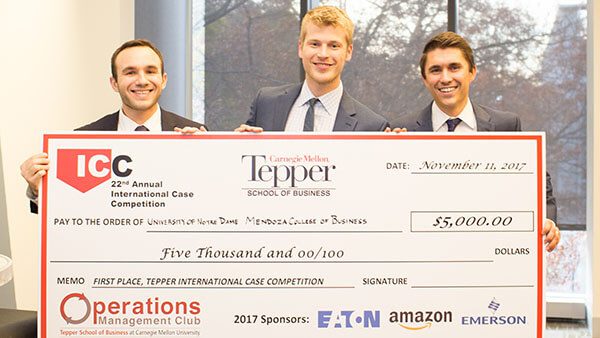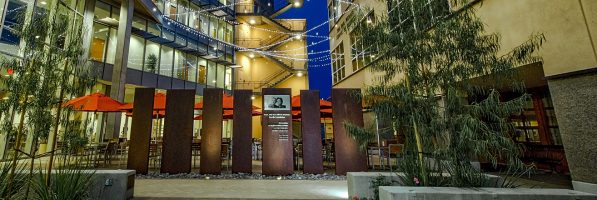Marshall Online MBAs Tap into IBM Watson For Business Solutions

Online MBAs enrolled in the USC Marshall School of Business’ Opportunity Recognition and Implementation course were recently tasked with developing a startup that takes advantage of the supercomputing capabilities of IBM Watson, the tech company’s flagship artificial intelligence system.
The course, taught by Professor of Clinical Business Communication Pete Cardon and Associate Professor of Clinical Entrepreneurship Elissa Grossman, has been part of the MBA curriculum at Marshall for two years. The project, meanwhile, goes as follows: Students studied how Watson’s analytics software works, and then identified a problem they can solve with that technology. Each team then formulated a business plan that could be introduced and put into action, and pitch it to a panel of entrepreneurs and venture capitalists.
“This is not an abstract exercise,” Cardon told USC Marshall. “This is a very intense project that places students in a situation where they are thinking about how to use cutting-edge technology for new products. And we provide access to the people who are really doing this—the experts at IBM.”
Each MBA team was supported by IBM mentors and experts, such as Daryl Pereira, the Creative Content Director of Watson and Cloud Platform. Pereira told USC Marshall that IBM’s collaboration with the school and it’s Online MBAs has produced impressive results.
“We knew it would be exciting partnering with USC to explore the possibilities of artificial intelligence with the brightest business minds,” Pereira said. “What we weren’t prepared for was the creativity in the startup ideas from the students: everything from the automated review of legal contracts to the creation of a data-driven record label.”
This year’s winning was the Music Predictor, a plan drawn up by the MBA team of Steven Truong, Michele Rosette, and Erin Young. The predictor was described as “a cognitive tool that analyzed song metadata and social media to provide projections of future revenue for a potential song, allowing smaller record labels to refine their budgets.” As the winner of the pitch competition, the Music Predictor team earned an invitation to the IBM Watson Developer Conference.
“We spent a significant part of our time applying our fresh business knowledge to the various IBM technologies that were showcased,” Troung said. “We discussed feasibility of novel technology-business concepts, pondered the unmet market needs for various exhibitions and discussed real startups with more veteran entrepreneurs that are in high-growth technology spaces.”
Notre Dame Mendoza Team Takes Top Prize in Annual International Case Competition

A team of Notre Dame Mendoza School of Business MBA students won first place and a cash prize of $5,000 in the 22nd Annual International Case Competition (ICC). The competition was held earlier this month at Carnegie Mellon’s Tepper School of Business and was organized by Tepper’s Operations Management Club.
The competition provides student teams experience in organizing and prioritizing issues, applying decision-making skills, working in teams, and developing innovative solutions—all under the pressure of competition, according to the Operations Management Club. The competition unfolds over two rounds—a 20-minute presentation followed by a 10-minute Q&A session in the first round, and a 30-minute presentation to the judges in the finals.
The Mendoza team was made up of Christopher Kunnen (’18), Austin Gilbertson (’19), and Zachary Kozak (’18). They beat out 10 teams from top universities across the country, including MIT Sloan School of Management and Carnegie Mellon University Tepper School of Business.
“Overall, case competitions are a great experiential component to the MBA experience,” Kozak said. “The competitions combine both real-world problem solving and simulating the time-constraint project management challenges that we as professionals will experience in the future.”

Mendoza’s MBA winners, from left to right: Zachary Kozak, Christopher Kunnen, and Austin Gilbertson/Photo courtesy of the Mendoza College of Business
The Notre Dame MBA team won thanks to their ability to identify the key issues in the case and its development of data-driven insights and recommendations that went beyond expectations.
“We employed a key take-away from one of our favorite professors, Dan Connors, who teaches the course Lessons from Turnaround Situations in the fall term,” Kozak said. “Dan, a former Bain consultant, conveyed to us early on to follow the strategy of ‘Listen, Deliver and then Add’ for any business problem. We replicated this approach when analyzing the problem and then building our presentation.”
ICC also connects leading operations talent with multinational sponsor companies for networking and recruiting opportunities, including Eaton, Amazon, and Emerson.
Verizon is on the Lookout for MBA Students and Grads

Telecom giant Verizon Communications provides wireless and wired telephone, internet and television service, in addition to cloud-based services to businesses. One of the largest wireless service providers in the United States, and among the largest communications technology companies in the world, Verizon employs nearly 200,000 employees—including a large number of MBAs.
Working at Verizon
Working at Verizon has its perks. In addition to competitive salaries and performance-based incentives, benefits include 401(k) savings with company match and discounts on Verizon products. Some Verizon offices also feature in-house gyms, or discounted gym memberships. The company is also committed to lifelong learning, providing training, development, and tuition assistance
Other worthy benefits Verizon employees can take advantage of include:
- Adoption expense assistance
- A matching gifts program
- Military discounts
- Employee Relief Fund for victims of natural disasters
- Best-in-class health and insurance benefits
- Healthy Pregnancy Program for expectant mothers
Verizon was also recently recognized as the top company for diversity leadership by Diversity MBA Magazine.
“Being good at diversity and inclusion is not an option at Verizon. With more than 180,000 employees serving customers in more than 2,700 cities spanning more than 150 countries, Verizon is privileged to serve a very vibrant and diverse marketplace,” said Magda Yrizarry, Verizon Chief Talent and Diversity Officer.
“Being successful with a customer base like this is not possible without a diversity of people, ideas, and experiences,” Yrizarry added.
According to Diversity MBA Magazine, Verizon recruiters maintain close relationships with organizations like the Society of Women Engineers, the National Society of Black Engineers, and Hispanic Business Students and Professionals. The company also has a fantastic track record of hiring women and minorities, with women and people of color making up about 60 percent of the company’s board of directors, while women specifically make up 37 percent of senior management.
Verizon was also one of the first major companies to offer benefits to same-sex couples in domestic partnerships and provide free preventative care services to women, such as on-site mammography screenings. The company is also well-known for its practice of recruiting veterans.
“Verizon is a diverse company in its people, ideas, services, and the communities it serves,” Yrizarry said. “Our workplace culture ensures that everyone, no matter their ethnicity or background, has opportunities to contribute to the solutions required to stay relevant and competitive in the marketplace, grow professionally and advance their career.”
Joining the Verizon Team
Verizon offers a number of internships and MBA Leadership Developmental Programs to graduate business students. According to MBA Exchange, these programs offer MBAs a first-hand rotational learning experience focused in different aspects of the company. With so many different paths and career opportunities at the company, these programs are an opportunity to build strong leadership skills in a particular division of Verizon.
MBA opportunities include:
- Marketing MBA Internship
- MBA Business Transformation Internship
- MBA Finance Leadership Developmental Program
- MBA Marketing Leadership Developmental Program
- MBA Product Management and Strategy Internship
- Supply Chain MBA Internship
What Are These Jobs Like?
Let’s take a look at some of these Leadership Developmental Programs. The Supply Chain MBA Leadership Development Program is a two-year rotational program designed to develop future Supply Chain leaders at Verizon. MBAs work on projects that develop skills in supply chain, operations, strategic planning, and sustainability. Students in the Supply Chain MBA Leadership Development Program may be assigned to any of the following focus areas:
- Supplier Management
- Strategic Supply Chain Planning
- Inventory Management and Logistics
Meanwhile, the Marketing MBA Leadership Development Program challenges business students with high-impact projects that develop their skills in branding, product management, and marketing strategy. The two year rotational program is designed to develop skills in:
- Business or consumer product management
- Marketing strategy
- Marketing operations
- Branding
- Promotions
Who is Verizon Looking For in New Hires?
Verizon specifically states the type of candidates they are looking for in various job descriptions on the web. These jobs call for “a motivated self-starter” who is “never satisfied with the status quo.” The telecom giant seeks candidates who are always trying to beat a personal best and thrive in fast-paced environments where new challenges come up every day. Prospective hires should be flexible, dependable, and work well in varying environments.
It’s also a plus if any MBA internship candidate has:
- Proven record of academic, professional and leadership achievement
- Excellent organizational, analytical and critical thinking skills
- Strong quantitative and technical skills
- Great verbal, written, communication and presentation skills
- Proficiency with Microsoft Office Suite
You can find more Verizon job opportunities here.
Part-Time MBA Battle: Houston v. Dallas

Among the bustling metros of the Lone Star State, Dallas and Houston are the biggest. Locals from the Houston and Dallas metros are die-hard about their towns, and their business schools take their MBA programs seriously. Both cities offer plenty of part-time options to prospective MBAs, so let’s take a deeper dive.
Location
While Houston and Dallas are only about four hours away by car, each metro offers completely different living experiences. As far as weather goes, if you dislike humid climates, Dallas may be the location for you. If you love being by the water, Houston may be up your alley—though the city, unfortunately, is more at risk for tropical storms and hurricanes.
Houston is statistically the more expensive city to live in, but not by a significant margin. According to Numbeo, a database of user contributed data about cities, you would need around $4,242 in Houston to maintain the same standard of life that you can have with $4,000 in Dallas, assuming you do not own a home. As far as entertainment goes, it’s really a tie: Both metros boast great restaurants, shopping, sports entertainment, and nightlife.
Here are a couple more quick stats comparing Houston and Dallas, courtesy this awesome infographic from SpareFoot:
- Houston is the 5th best US city for good jobs, Dallas ranks 18th.
- Houston is the 5th best US city for job seekers, Dallas is 6th.
- Dallas has the 13th lowest unemployment rate in the US, Houston is 18th.
- Dallas has the 9th most affordable housing marketing in the US, Houston is 8th.
Not every MBA candidate can manage a full-time degree program. So many business school students continue to work throughout their studies, balancing a job and graduate school through a part-time MBA program. Many of these programs take place in the evenings and on weekends, allowing for flexibility along with continued professional growth.
Dallas Part-Time MBA Programs
The following schools in the Dallas metro offer part-time MBA programs:
- Cox School of Business – Southern Methodist University
- Naveen Jindal School of Management – University of Texas at Dallas
- Neeley School of Business – Texas Christian University
- University of North Texas College of Business
- University of Texas at Arlington College of Business
The Southern Methodist Professional MBA features a flexible and modular curriculum that students can customize to their learning and future career goals. Students have the option to choose a concentration and a minor from nine subject areas, including: accounting, finance, general business, information technology and operations management, management, marketing, real estate and strategy, and entrepreneurship.
The estimated total cost of the aforementioned Professional MBA program is $93,696. This figure excludes costs such as books, materials, housing, or transportation. However, approximately 60 percent of students receive some form of financial aid, either need-based or consumer loans.
The Professional MBA program at the Naveen Jindal School of Business consists of taking two classes each semester, and classes are usually offered Monday-Friday from 4 to 10 p.m. The program is offered three different formats: a Evening Cohort, Flex, and Online. The Evening cohort option can be completed in 24 months, and allows the entire intake to experience the 30 required classes together. The Flex program lets students finish their degree on their own schedule, online and on campus. Similarly, the Online MBA offers plenty of scheduling options, but a limited choice of electives and concentrations.
Tuition costs depend on the amount of courses taken per semester and which track students are enrolled in. At UT Dallas, students pay lower per credit when taking more classes per semester. The estimated cost for tuition and fees for in-state residents in the Evening PMBA program is $42,347, and $78,449 for non-residents and international students. Tuition and fees for resident students in the online program is estimated at $49,531, with non-resident tuition at $84,016. Scholarship opportunities are available.
The Professional MBA at the Neeley School of Business meets twice a week in the evenings. The cohort-based program that can be completed in as little as 24 months or as many as 33 months—the amount of time it takes to complete the program depends on how students schedule their elective courses.
One year of the Texas Christian Professional MBA program costs an estimated $33,090, which includes tuition and other program fees. Books and other course materials are estimated at about $1,000.
Students in the University of North Texas MBA program have the option of taking courses on a full-time or part-time basis, and can earn a MBA degree in such areas as finance, health services management, marketing, logistics and supply chain management, organizational behavior and human resource management, strategic management, or business studies. Students completing the MBA in business studies also have the opportunity to complete a concentration in international business, library science and technology, real estate, or sustainability.
The UT Arlington Professional Cohort MBA structure is created for experienced professionals who want to continue to work full-time and follows the same 45-credit hour curriculum as the MBA flexible structure. The cohort structure allows students to complete courses in accelerated five or eight-week sessions, which allows students to complete their MBA in 24 months. This format is only offered at the Fort Worth campus. The estimated cost of the MBA program at the University of Texas at Arlington College of Business is $25,382.
Houston Part-Time MBA Programs
The following schools in the Houston metro offer part-time MBA programs:
- C.T. Bauer College of Business – University of Houston
- Cameron School of Business – University of St. Thomas
- Jesse H. Jones School of Business – Texas Southern University
- Rice University – Jones Graduate School of Business
- University of Houston – Downtown
The University of Houston Professional MBA program is a flexible program that takes 22 months to complete and consists of 48 credit hours. Students must complete 21 core credit hours and 27 elective credit hours.
Tuition costs at Bauer are estimated at $42,000 for Texas residents, $66,600 for non-resident students, and $72,000 for international students. Costs can change depending on how many classes a student is taking and their student status MBA students can get financial assistance in the form of student loans and scholarships, such as the MBA Bauer Excellence Scholarship. Students can receive up to $10,000 per year, qualify for in-state tuition (for nonresidents) and receive a two-year subscription to The Wall Street Journal.
The Cameron School of Business offers a flexible MBA that holds classes on the weekends and in the evenings. Students in the MBA program at Cameron are required to complete 36 academic hours: 27 hours are in core course and nine credit hours are elective courses.
The cost of the Cameron School of Business MBA program is $1,163 per credit hour. Students taking eight or fewer credit hours per semester are required to pay a $47 activity fee. Those students taking nine or more hours are required to pay $82. Students must also pay a $100 new graduate student fee and an $80 technology fee. Students are required to pay all fees every fall and spring semester.
The Texas Southern MBA program at the Jesse H. Jones School of Business provides a general management education to students who are looking to advance their current careers in business management, and can be taken in a full-time or part-time schedule. Part-time program students can complete their MBA degree over a flexible amount of time, depending on their availability to complete courses. All students complete courses over the fall, spring, and summer semesters.
The Jones MBA costs about $7,130.38 a year for in-state residents and $13,700.38 a year for out-of-state folks. Other fees such as room and board, transportation, books and other personal expenses are not factored in the cost of the program.
Rice University’s MBA for Professionals is a flexible program that offers an evening or weekend option to allow students to maintain their current work schedules. The traditional professional MBA is held in a lock-step format while the Extended Professional MBA program holds classes two evenings a week during the first semester and one evening a week after that. Students in this program can extend their education for three years or more, up to five, in order to better fit with their schedule.
The current tuition cost is $101,500 for the Evening and Evening Extended programs and $105,500 for the Weekend program. The tuition covers the complete 22-month schedule of coursework and is billed in 25 percent increments over four semesters.
The University of Houston Downtown part-time MBA can be completed in two or three years. Classes are offered in a hybrid form, with some classes taking place on campus and others online. Students may elect to pursue a “soft start” to their MBA, where students pursue their concentration classes first, or a traditional-start MBA students, where they take core classes the first year, followed by concentration classes in the second year.
The school also offers a three-year path to an MBA where students work on their concentration the first year and then take the core classes in the second and third years, or elect to pursue a traditional start by taking core classes in the first two years and concentration courses in their third year.
At $532 per credit hour for in-state students, tuition for a UHD MBA varies depending on the concentration. Students concentrating on finance, human resource management, leadership management, or business development/sales management will pay $21,840. Concentrations in supply chain management, international business or accounting cost $23,940. An MBA with a general management concentration costs $18,088. Out-of-state students pay about $28,300 and out-of-country students pay around $28,480.
How Boston Business Schools Help Low-Income MBA Applicants

Anyone planning on earning a postgraduate business degree knows that MBA programs cost a lot of money. In the Boston metro, where the cost of living is already high, the annual cost of an MBA program can reach upward of $100,000 … Ouch! Continue reading…
Merage School of Business MBA Earns Praise From The Economist

The UC Irvine’s Merage School of Business received some good news after the school was ranked in latest business school rankings of The Economist. The school placed 39th in the nation, 16th among public schools, and 56th in the world. The Los Angeles metro business school also scored well in categories including 29th in Open New Career Opportunities; 17th in alumnus rating of career services; and 13th in salary increase.
Continue reading…
